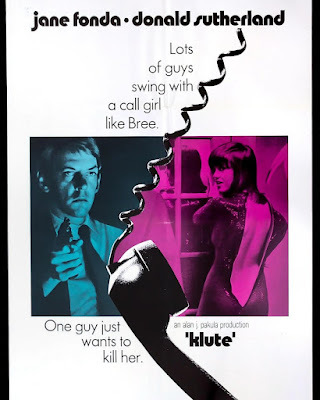An Ode to the Elastic, Electric Donald Sutherland

I first knowingly encounteredthe late Donald Sutherland in 1968, in an odd little British film called Joanna.Then and now, I’ve been unsure if Joanna was intended as an ode toSwinging London (the miniskirts! the casual sex!) or a morality tale or aspoof. It did have a very pretty leading lady, a score by Sixties fave RodMcKuen, and several hunky young men. It also had Sutherland as the wealthy butterminally ill Lord Peter Sanderson, who hosts Joanna and her groovy friends athis sumptuous home in Morocco. When he came on screen, I thought I had neverseen such a weird-looking person. There was a fey quality to him that had mecompletely baffled: was there some sort of comment being made about hissexuality? I didn’t know, but I didn’t much care. Joanna was a moviethat didn’t invite hard thinking.
It took a while to realizeI’d seen Sutherland a year earlier in a vastly different role, that of a not-too-brightSoutherner named Vernon Pinkley who hilariously steps in to impersonate ageneral in a World War II action drama, The Dirty Dozen. That was thething about Sutherland: you couldn’t pin him down. Even his nationality seemedflexible: the Canada-born Sutherland played British and American roles withequal conviction.
It was in 1970 thatSutherland had his big Hollywood breakthrough. Though for fans of thelong-running TV series, Alan Alda will always be the REAL star of M*A*S*H, RobertAltman’s original film starred Sutherland as Hawkeye Pierce. He and ElliottGould as best buddy Trapper John McIntyre found stardom as two youngbattlefield surgeons who cope with the horrors of the Korean War by way ofoutrageous antics. One year later he played the title role in Klute, aneo-noir thriller best remembered for Jane Fonda’s Oscar-winning role as aprostitute being stalked by a killer. Sutherland’s role is that of a detectivewho becomes Fonda’s protector and then her lover. The powerful connectionbetween Fonda and Sutherland, whichallegedly spilled over into their personal lives, led to Sutherland’s deepinvolvement in Fonda’s crusade against the Vietnam War.
Another intensely dramaticrole for Sutherland was opposite Julie Christie in 1973’s psychologicalthriller, Don’t Look Now. The eerie Venice-set drama, brilliantly directedby Nicolas Roeg, focuses on young parents trying to get past the accidentaldeath of their young daughter. In the midst of their all-consuming grief, there’s a sex scene that raised many eyebrowsfor its convincing eroticism, leaving some viewers certain that the intimacy onscreen was genuine. (Sutherland hasstaunchly denied this.) He was also a grieving father in Robert Redford’sOscar-winning Ordinary People (1980), though most of the film’saccolades went to Mary Tyler Moore and young Timothy Hutton, who played hiswife and his surviving son. But none of this should imply that Sutherland onlytook on somber roles. He played everyone from heroes to goofballs, like thepot-smoking professor in National Lampoon’s Animal House. He was even astuffy British patriarch (and Keira Knightley’s father) in Joe Wright’s 2005version of the Jane Austen classic, Pride and Prejudice, as well as thechief villain in The Hunger Games. Though Oscar nominations eluded him,the Academy in 2017 granted him an honorary Oscar “for a lifetime of indeliblecharacters, rendered with unwavering truthfulness."
Today son Kiefer (named afterDonald Sutherland’s very first director) carries on the family commitment toscreen acting. But it’s unlikely he’ll ever top his father’s long and variedlist of achievements.
Beverly in Movieland
- Beverly Gray's profile
- 10 followers



